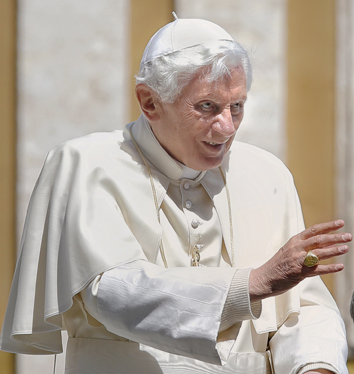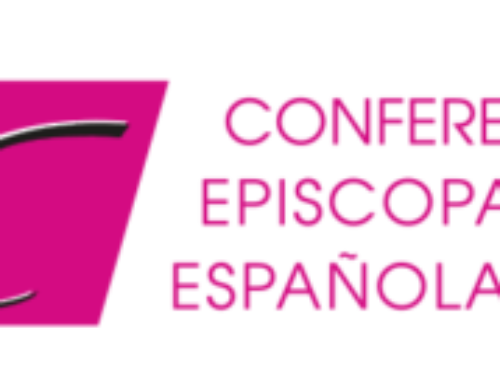
MESSAGE OF THE HOLY FATHER ON THE OCCASION
OF THE TWENTIETH WORLD DAY OF THE SICK
(11 FEBRUARY 2012)
“Stand up and go; your faith has saved you” (Lk 17:19)
Dear Brothers and Sisters!
On the occasion of the World Day of the Sick, which we will celebrate on 11 February 2012, the Memorial of the Blessed Virgin of Lourdes, I wish to renew my spiritual nearness to all sick people who are in places of care or are looked after in their families, expressing to each one of them the solicitude and the affection of the whole of the Church. In the generous and loving welcoming of every human life, above all of weak and sick life, a Christian expresses an important aspect of his or her gospel witness, following the example of Christ, who bent down before the material and spiritual sufferings of man in order to heal them.
1. This year, which involves the preparations that are nearest to the Solemn World Day of the Sick, which will be celebrated in Germany on 11 February 2013 and which will dwell upon the emblematic gospel figure of the Samaritan (cf. Lk 10:29-37), I would like to place emphasis upon the ‘Sacraments of healing’, that is to say upon the Sacrament of Penance and Reconciliation and that of the Anointing of the Sick, which have their natural completion in the Eucharistic Communion.
The encounter of Jesus with the ten lepers, narrated by the Gospel of St. Luke (cf. Lk 17:11-19), and in particular the words that the Lord addresses to one of them, “Stand up and go; your faith has saved you” (v. 19), help us to become aware of the importance of faith for those who, burdened by suffering and by illness, draw near to the Lord. In their encounter with him they can truly experience that he who believes is never alone! God, indeed, in His Son, does not abandon us to our anguish and suffering, but is near to us, helps us to bear them, and wishes to heal us in the depths of our hearts (cf. Mk 2:1-12).
The faith of that only leper who, after seeing that he was healed, full of amazement and of joy, and differently from the others, immediately went back to Jesus to express his gratitude, enables us to perceive that reacquired health is a sign of the salvation that God gives to us through Christ; it finds expression in the words of Jesus: your faith has saved you. He who in his suffering and illness prays to the Lord is certain that his love will never abandon him, and also that the love of the Church, the extension in time of the Lord’s salvific work, will never disappear. Physical healing, an expression of the deepest salvation, thus reveals the importance that man – in his entirety of soul and body – has for the Lord. Each Sacrament, for that matter, expresses and actuates the nearness of God Himself, who, in an absolutely freely-given way, ‘touches us through material things…that he takes up into his service, making them instruments of the encounter between us and himself’ (Homily, Chrism Mass, 1 April 2010). ‘The unity between creation and redemption is made visible. The sacraments are an expression of the physicality of our faith, which embraces the whole person, body and soul’ (Homily, Chrism Mass, 21 April 2011).
The principal task of the Church is certainly the proclaiming of the Kingdom of God, ‘But this very proclamation must be a process of healing: “bind up the broken-hearted” (Is 61:1)’ (ibidem), according to the charge entrusted by Jesus to his disciples (cf. Lk 9:1-2; Mt 10:1,5-14; Mk 6:7-13). The tandem of physical health and renewal after lacerations of the soul thus helps us to understand better the ‘Sacraments of healing’.
2. The Sacrament of Penance has often been at the centre of the reflection of the Pastors of the Church, specifically because of its great importance in the journey of the Christian life, given that ‘The whole power of the sacrament of Penance consists in restoring us to God’s grace, and joining with him in an intimate friendship’ (Catechism of the Catholic Church, 1468). The Church, in continuing the proclaiming of forgiveness and reconciliation which Jesus strongly expressed, never ceases to invite the whole of humanity to convert and to believe in the Gospel. She makes her own the call of the Apostle Paul: ‘So we are ambassadors for Christ, as if God were appealing through us. We implore you on behalf of Christ, be reconciled to God’ (2 Cor 5:20). Jesus, during his life, proclaimed and made present the mercy of the Father. He came not to condemn but to forgive and to save, to give hope in the deepest darkness of suffering and sin as well, and to give eternal life; thus in the Sacrament of Penance, in the ‘medicine of confession’, the experience of sin does not degenerate into desperation but encounters the Love that forgives and transforms (cf. John Paul II, post-synodal apostolic exhortation Reconciliatio et Paenitentia, 31).
God, ‘rich in mercy’ (Eph 2:4), like the father of the gospel parable (cf. Lk 15:11-32), does not close His heart to any of His children, but waits for them, looks for them, reaches them where rejection of communion imprisons them in isolation and division, and calls them to gather around His table, in the joy of the feast of forgiveness and reconciliation. A time of suffering, in which the temptation could arise to abandon oneself to discouragement and hopelessness, can thus be transformed into a time of grace so as to re-enter oneself, and like the prodigal son of the parable, to think anew about one’s life, reconsidering its errors and failures, feeling nostalgia for the embrace of the Father, and following the pathway to His home. He, in His great love, always, and whatever the case, watches over our existence and awaits us so as to offer to every child that returns to Him the gift of full reconciliation and joy.
3. From a reading of the Gospels it clearly emerges how Jesus always demonstrated especial concern for sick people. He not only sent out his disciples to tend their wounds (cf. Mt 10:8; Lk 9:2; 10:9) but also instituted for them a specific sacrament: the Anointing of the Sick. The Letter of James attests to the presence of this sacramental act already in the first Christian community (cf. 5:14-16): by the Anointing of the Sick, accompanied by the prayer of presbyters, the whole of the Church commends the sick to the suffering and glorified Lord so that he may alleviate their sufferings and save them; indeed she exhorts them to unite themselves spiritually to the passion and the death of Christ so as to contribute thereby to the good of the People of God.
This Sacrament leads us to contemplate the double mystery of the Mount of Olives where Jesus dramatically found himself before the path indicated to him by the Father, that of his Passion, of the supreme act of love; and he accepted it. He is the mediator, ‘bearing in himself, taking on in himself the sufferings and passion of the world, transforming it into a cry to God, bringing it before the eyes and to the hands of God and thus truly bringing it to the moment of redemption’ (Lectio divina, Meeting with the Parish Priests of Rome, 18 February 2010). But ‘the Garden of Olives is also the place from which he ascended to the Father, and is therefore the place of redemption…This double mystery of the Mount of Olives is also always “at work” within the Church’s sacramental oil…the sign of God’s goodness reaching out to touch us’ (Homily of Chrism Mass, 1 April 2010). In the Anointing of the Sick, the sacramental matter of the oil is offered to us, so to speak, ‘as God’s medicine…which now assures us of his goodness, offering us strength and consolation, yet at the same time points beyond the moment of the illness towards the definitive healing, the resurrection (cf. Jas 5:14)’ (ibidem).
This sacrament deserves greater consideration today both in theological thought and in pastoral action for sick people. In valuing the contents of liturgical prayer that are adapted to the various human situations connected with illness and not only when a person is at the end of his or her life (cf. Catechism of the Catholic Church, 1514), the Anointing of the Sick should not be held to be almost ‘a minor sacrament’ when compared to the others. Attention to, and pastoral care for, sick people, if it is, on the one hand, a sign of the tenderness of God towards those who are suffering, on the other brings spiritual advantage to priests and the whole Christian community as well, in the awareness that what is done to the least, is done to Jesus himself (cf. Mt 25:40).
4. As regards the ‘Sacraments of Healing’, St. Augustine affirms: ‘God heals all your infirmities. Do not be afraid, therefore, all your infirmities will be healed…You must only allow Him to cure you and you must not reject His hands’ (Exposition on Psalm 102, 5; PL 36, 1319-1320). These are precious instruments of the Grace of God which help a sick person to conform himself or herself ever more fully to the Mystery of the Death and Resurrection of Christ. Together with these two sacraments, I would also like to emphasise the importance of the Eucharist. Received at a time of illness, it contributes in a singular way to working this transformation, associating the person who partakes of the Body and Blood of Christ to the offering that he made of himself to the Father for the salvation of everyone. The whole ecclesial community, and parish communities in particular, should pay attention to assuring the possibility of frequently receiving holy Communion, to those people who, for reasons of health or age, cannot go to a place of worship. In this way, to these brothers and sisters is offered the possibility of strengthening their relationship with Christ, who was crucified and rose again, participating, through their lives offered up for love of Christ, to the very mission of the Church. From this point of view, it is important that priests who offer their delicate work in hospitals, in nursing homes and in the homes of sick people, feel ‘”ministers of the sick”, signs and instruments of Christ’s compassion who must reach out to every person marked by suffering’ (Message for the XVIII World Day of the Sick, 22 November 2009).
Conformation to the Paschal Mystery of Christ, achieved through the practice of spiritual Communion as well, takes on a meaning that is totally special when the Eucharist is administered and received as viaticum. At that moment of existence there sound out in an even more incisive way the words of the Lord: “Whoever eats my flesh and drinks my blood has eternal life, and I will raise him on the last day” (Jn 6:54). The Eucharist, indeed, above all as viaticum, is – according to the definition of St. Ignatius of Antioch – ‘medicine of immortality, the antidote for death’ (Letter to the Ephesians, 20: PG 5, 661); the sacrament of the passage from death to life, from this world to the Father, who awaits everyone in the celestial Jerusalem.
5. The theme of this Message for the Twentieth World Day of the Sick, ‘Stand up and go; your faith has saved you’, also looks forward to the forthcoming ‘Year of Faith’ which will begin on 11 October 2012, a propitious and valuable occasion to rediscover the strength and beauty of faith, to examine its contents, and to bear witness to it in daily life (cf. Apostolic letter Porta fidei, 11 October 2011). I wish to encourage sick people and the suffering to always find a safe anchor in faith, nourished by listening to the Word of God, by personal prayer and by the Sacraments, while I invite pastors to be increasingly ready to celebrate them for the sick. Following the example of the Good Samaritan and as guides of the flocks entrusted to them, priests should be full of joy, attentive to the weakest, the simple and sinners, expressing the infinite mercy of God with reassuring words of hope (cf. St. Augustine, Letter 95. 1: PL 33, 351-352.
To all those who work in the world of health, and to the families who in their relatives see the suffering Face of the Lord Jesus, I renew my thanks and that of the Church, because, in their professional expertise and in silence, often without even mentioning the name of Christ, they manifest him in a concrete way (cf. Homily, Chrism Mass, 21 April 2011).
To Mary, Mother of Mercy and Health of the Sick, we raise our trusting gaze and our prayer; may her maternal compassion, experienced at the side of the Son dying on the Cross, accompany and sustain the faith and the hope of every sick and suffering person on the journey of healing the wounds of the body and the spirit!
I assure you all that I remember you in my prayers, while I bestow upon each one of you a special Apostolic Blessing.
From the Vatican, 20 November 2011, Solemnity of Our Lord Jesus Christ, King of the Universe.
Benedictus PP XVI









